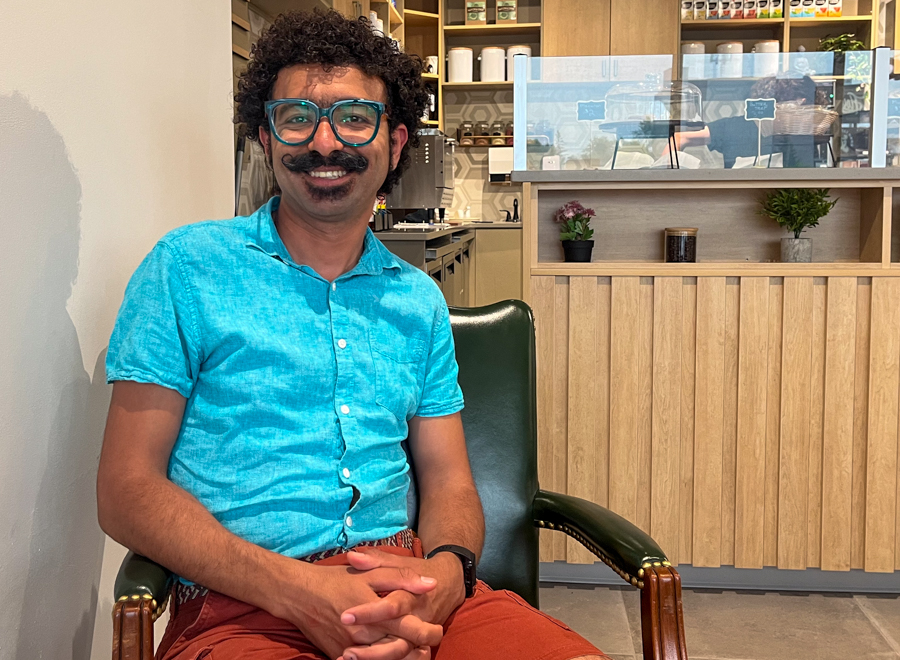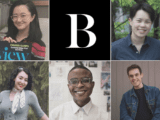Marcus Zacharia grew up so immersed in Egypt’s Coptic Orthodox church community, his childhood was “nothing but being a Copt.”
“I didn’t listen to any kind of music except for Coptic music, I learned Arabic, my mother tongue, from [Coptic Egyptian magazine] Al Kiraza,” he said.
You may unsubscribe from any of our newsletters at any time.
Copts, an ethnoreligious group Indigenous to North Africa, are connected to one of Christianity’s oldest churches. Though the millions of Copts in Egypt play a dynamic role in society, they’ve endured systemic oppression for centuries. Many have moved within the diaspora, seeking more freedoms and economic opportunities.
But when Zacharia, a healthcare worker, moved to North America, he noticed that many Copts in the diaspora shied away from honest conversations about who they were and how they related to other communities.
He co-created ProgressiveCopts to open an alternative, independent dialogue and lead conversations on progressive change.
He spoke with Broadview intern Mark Ramzy, who is also a Copt, about this journey.
Mark Ramzy: What does it mean to be a ‘progressive Copt?’
Marcus Zacharia: Progressive Copts are folks who have been having a lot of ideas that are against the mainstream in Coptic communities. As Copts, you find folks living a double life. The kind of conversation that you can have officially, inside churches, can be totally different than what we would be having at homes, at gatherings outside of the church. For example, since the [ProgressiveCopts] account was born at the moment of George Floyd’s death, I was seeing lots of different reactions: support, hate, conversations about Blackness, and ambivalence for questioning. ‘What do we need to do?’ ‘Are we related to what has happened?’ ‘How are we related to Black communities?’ ‘What’s our position?’ Folks want to talk about so many more things than just what’s supervised or monitored by the church institution.
MR: Why is it important to talk about racism, sexuality, gender, interfaith dialogue, decolonization, etc. in the Coptic diaspora community?
MZ: Many folks in the diaspora grew up here and they have been missing some parts of the conversation about identity as Copts. It’s a spectrum: I found some people that did not want to relate to Copticity in any way. They already moved on and assimilated themselves in other communities. Or [there are] folks at the other side of the spectrum, who grew up here, who are ‘extremist’ Copts—because for a lot of Copts, a major reason for moving out of Egypt was because of oppression at the hands of systems that call themselves ‘Islamic.’ Folks who live here have more freedom to talk about gender diversity, different sexual orientations and being part of communities that we are not necessarily connected to in the motherland.
I like to call myself a progressive traditionalist, which is like an oxymoron. Many Copts are proud of their traditions, and at the same time, they are not necessarily in agreement with the church institutions on certain topics. For example, the assumption that if you are a queer Copt you would be unfaithful, or not spiritual. The reality shows that many queer Copts are very faithful. In Egypt, you’re likely either Muslim or Christian, but here, you can be many things at the same time and you can also be proud of your culture. For us Copts, I think we can practice our diversity, our cultural histories, and we can be proud, we can be faithful, we can be progressive, we can be hopeful, we can be all these things together.
MR: Oppression has historically been central to Copts’ identity. Do you feel that hinders progress?
MZ: I always want to share a hopeful message instead of just centering persecution. When we centre our oppression, we don’t centre the oppression from the church institution and we don’t centre the oppression from the ruling systems in Egypt. We centre the historical oppression from systems that call themselves ‘Islamic,’ which is super limiting and narrow-minded.
We have been going through multiple layers of oppression and there are many nuances that we are missing. Especially in the diaspora, in the present, it has been constantly used by right-wing entities that have been tokenizing our oppression. They were the ones who have been constantly marketing the word ‘persecution’ over ‘religion-based oppression’ or ‘discrimination’ to prevent us from connecting with other communities. We could be connecting to Muslims who are facing religion-based discrimination in North America or we can be connecting with Baháʼís or Shia Muslims in Egypt. By centering our own persecution, we are prioritizing our struggle over other people’s struggle which doesn’t serve us in the diaspora in building bridges and connecting with other minorities.
View this post on Instagram
MR: How has all of this impacted your own faith journey and ideas of your identity?
MZ: The impact of finding this community and the joy of others not feeling lonely and celebrating their Copticity is super joyful. I’m also privileged that many Coptic folks know me in the church. But at the same time, I do not want to live a double life where at work I am a queer and Muslim ally and at church I need to be homophobic, transphobic and Islamophobic. I do not need to do that. I’m also not against the double life entirely because for many reasons, folks might not have the privilege to not live a double life.
There has also been a negative impact because we receive lots of hate, and you get death threats. It can be very scary, which has also impacted my mental health. But there are others who are overjoyed as Copts who disconnected themselves from the community because of how different they feel and then finally they found a place that speaks to them.
It’s giving me hope for the future—that my kids and other kids can celebrate their Copticity without needing to change or bend themselves because of the church or community.
MR: What is your message to other Copts struggling to fit in or living a double life?
MZ: I’m getting emotional thinking about this because—
MR: We can pause if you want.
MZ: No, I’m okay. I would say I hear, and I feel their pain. I know this way of living is not easy for them—I have been there. I would tell them that they need to know that they are Copts no matter what. They are not alone— there are many people like them. I also tell them that they don’t need to break out of the community. If they have the capacity to get into meaningful conversations and be empathetic with other Copts, go for it.
I don’t think that we need a revolution. We can have conversations that are life-changing around dinner tables. I don’t think that the change is going to come from within the church. We can create alternative spaces. One of the joys is when you see progressive Coptic folks who are starting new initiatives through the community. Find other folks who you resonate with and connect with them and make more accounts like ProgressiveCopts. I’m very hopeful.
***
This interview has been edited for length and clarity.
Mark Ramzy is a summer intern at Broadview.













